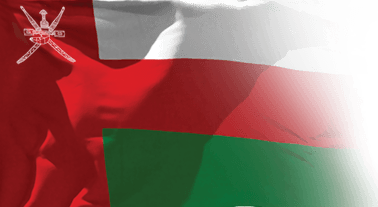The foreign policy of the Sultanate of Oman is dedicated to peace and security. It is based on certain core principles, which are rooted in an understanding of Oman as an active participant in a mutually supportive global community.
A good neighbour
Oman strongly believes in developing and maintaining good relations with all its neighbours.
It has been a consistent aim of Omani foreign policy to ensure that its relations with its neighbours are characterised by friendship, mutual respect, non-interference and understanding.
Oman’s neighbours include the fellow members of the Arab Gulf Cooperation Council, with whom, Oman has developed extensive economic and security collaboration, contributing substantially to mutual security during a period of uncertain regional stability.
For Oman, the concept of neighbour extends beyond immediately adjacent countries, to embrace other important partners whose proximity and significance qualifies them as neighbouring states.
Yemen, Iran, India and Pakistan are thus among the most important neighbours.
Some neighbours may from time to time find themselves in conflict or dispute with one another.
Oman’s good neighbour principle requires it to do all it can, not just to maintain its own good relations with the neighbours, but also to help its neighbours maintain good relations with one another.
This is important to Oman. The stability of the immediate neighbourhood is a vital element in Oman’s own security and Oman’s long-term economic prospects.
Oman therefore always stands ready to help its neighbours by offering readiness to facilitate consultation over various issues of mutual concern.
Tolerance
Throughout the history of Oman’s relations with the rest of the world, tolerance has been a key factor. It continues to be so.
Tolerance requires an enlightened understanding and respect for the cultures, views and beliefs of other peoples. Within the framework of exchanges with other countries, Oman avoids rushing to judgements that can soon harden into prejudice.
Without tolerance, it is difficult to develop sustainable relations, make lasting friendships, or create the partnerships needed to secure benefits for all.
Oman’s foreign policy is based on a firm conviction that confronting the challenging problems of the time can only succeed by adhering to a vision shaped by tolerance.
Oman practices a diplomacy that encourages all parties to give room to the language of tolerance and dialogue while exerting every possible effort to defuse tension, with wisdom, good advice and responsible cooperation.
At the same time, Oman is ready to stand up to whoever attempts to undermine tolerance and dialogue or interfere in its internal affairs.
Dialogue
For Oman and Omanis, dialogue is a key element in addressing all issues, both domestic and foreign.
Oman’s foreign policy never closes any avenue of communication, however difficult a given crisis might be.
The Foreign Ministry is committed to the search for security and stability through peaceful means and dialogue, rather than conflict.
The Sultanate of Oman does not adopt a policy of exclusions or boycotts when it finds itself in disagreement with the views or positions of others.
Rather, it seeks to encourage others to adopt a policy of tolerance in order to achieve peaceful coexistence and fruitful partnership for all.
Oman’s foreign policy does not look for a security structure that favours the interests of any single power, but rather a security structure which accommodates the long-term and common interests of all those countries which are economically and strategically engaged with the region.
Outward looking
Oman’s vision for its development rests on a commitment to be outward looking, to engage with the world, to communicate and to trade.
The Foreign Ministry’s directions are therefore based on an internationalist outlook.
This draws on the country’s long-established traditions. Oman has a centuries-old history as a trading nation – its seafaring relations with countries around the world were all established because Oman was an outward looking, engaged nation.
Oman is proud to enjoy good relations of cooperation and friendship with a wide range of states, across the Gulf and the Middle East, across the Indian Ocean, in the West and in Asia – even as longstanding ties and associations take new forms in a fast-changing world.
Oman is at home in the modern world of economic globalisation. The Sultanate is a member of the World Trade Organisation and it is at the forefront of developing new regional forums in which business and trade can flourish across national borders in a truly globalised way.
Oman’s new and expanding ports are establishing it as a key international hub, for logistics and trans-shipment, ensuring that Oman plays a prominent role in both regional and international trade in the decades ahead.
Pragmatism
Oman’s foreign policy follows a pragmatic approach, emphasising geostrategic realities rather than temporary ideological positions.
This means that Oman resists the temptation to allow passing events to determine policy.
This principle is rooted in Oman’s geopolitical situation, and, in particular, in the responsibilities that come from the Sultanate’s location overlooking the Strait of Hormuz, the Sea of Oman, the Indian Ocean and the Arabian Sea.
The Strait of Hormuz is a vital waterway for the world and the region – protecting it from conflict is a special responsibility. Oman therefore strives to maintain conversation with all parties at all times. Oman cannot afford to abandon this responsibility under any circumstances.
This responsibility in turn requires that Oman maintains good relations with its neighbours. Neighbours are forever. Their views and interests may shift over time; policies and governments come and go. However, the people, and their culture, and the geography remain.
While Oman may have differences with certain governments, these are less important than the enduring people-to-people and nation-to-nation continuities that bind everybody.
Oman’s pragmatic approach is based on the confidence that in the long term, mutual interests will outlast short term difficulties.


